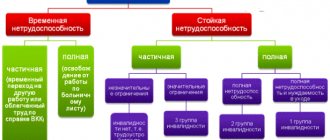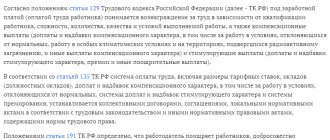Yulia Zhizherina, business consultant on personnel management and labor law, tells how to prepare salary documents to avoid fines.
Employers often make mistakes when describing wage conditions, which can lead to unpleasant consequences.
For incorrectly indicating the terms of remuneration in an employment contract, the employer may face administrative liability under Part 4 of Art. 5.27 of the Code of Administrative Offenses of the Russian Federation in the form of a fine on officials in the amount of 5,000 to 10,000 rubles; for legal entities - from 50,000 to 100,000 rubles.
If the employer incorrectly prescribed wage standards in local regulations, he may be held liable under Part 1 of Art. 5.27 of the Code of Administrative Offenses of the Russian Federation in the form of a fine on officials in the amount of 1,000 to 5,000 rubles; for legal entities - from 30,000 to 50,000 rubles.
If working conditions are incorrectly reflected in the employment contract or local regulations, there is also a risk of a dispute with the employee, who, to protect his rights, can appeal to both supervisory authorities and the court.
If an employee contacts supervisory authorities, the employer will in any case face an inspection. If the employee goes to court, then if a decision is made in his favor, he can also recover moral damages from the employer.
To avoid these risks, spell out the terms of remuneration correctly in all documents.
In local regulations
Labor laws governing wages are few in number. Art. 135 of the Labor Code of the Russian Federation states that wages are established by an employment contract in accordance with the current employer’s remuneration systems, described in local regulations. Thus, local regulations are the main documents regulating wages. Based on these documents, the terms of remuneration are reflected in the employment contract.
The only requirement for local regulations is that they do not worsen the situation of workers in comparison with the legislation.
What does the concept include?
Remuneration includes not only the classic salary, but also other monetary values. There are several parameters and criteria that an employee wants to see in the document:
- fixed salary amount (i.e. remuneration for work during a calendar month without taking into account auxiliary payments);
- the tariff rate in effect at the time of determining the conditions of labor payment. What is the tariff schedule by category and how is it formed - read the link;
- all kinds of additional payments for honest, selfless work;
- monetary incentives;
- supplements to the main part of the salary. Here you will find out who is entitled to the regional coefficient and the northern supplement.
Specialists - representatives of the personnel department - are often interested in what exactly appears in the labor agreement - wages or salary.
A detailed answer on this issue is presented in the Labor Code of the Russian Federation. The document must indicate both the salary and other payments due to the employee in accordance with the current regulations of the law.
You can watch how to properly organize wages in an enterprise in this video:
Regulatory framework for entering working conditions into TD
According to the provisions of Art. 57 of the Labor Code of the Russian Federation, the conditions are extremely mandatory for drawing up an employment agreement. They include the following criteria and elements:
- basic rate or salary (taking into account tariff features);
- allowances;
- bonus payments;
- incentive amounts.
Also, according to the provisions of Art. 57 of the Labor Code of the Russian Federation, the agreement must indicate the procedure for remuneration for work under conditions that deviate from the base. For example, this applies to overtime performance of work duties, going to work at night, weekends/holidays, etc.
It is also the responsibility of the payroll manager to determine the basic form in which the employee will be compensated for hard work.
In Part 1 of Art. 135 of the Labor Code of the Russian Federation states that the salary paid to a specific employee is subject to establishment within the framework of an employment agreement, in accordance with the working conditions existing within the walls of the enterprise. They are included in a section specially created by the employer dedicated to this issue.
Moreover, the list includes not only the main part of the salary, but also auxiliary payments of any shape, type and size.
In Art. 57 (part 2 paragraph 5) states that it is permissible in the agreement not to indicate specific size parameters for bonuses, allowances and surcharges. If these values are established by the employer, he has the right to indicate their sizes and varieties in the contract, as a reference to the LNA (this right is confirmed within the framework of the explanations provided by the Rostrud organization).
In the internal labor regulations
According to current practice, the internal labor regulations must necessarily reflect the timing of payment of wages (Article 136 of the Labor Code of the Russian Federation). In this case, specific dates should be specified.
To avoid errors in determining payment dates, keep in mind that wages must be paid at least every half month, and no later than 16 days after the end of the period for which they were accrued (ILO Recommendation No. 85):
“The official salary is paid to the Employee every half month for the time actually worked based on the time sheet: for the first half of the month - on the 16th day, for the second half - on the 1st day of the next month.”
As for the amount of wages for the first part of the month (the so-called advance), the rules need to stipulate that it is paid according to the time actually worked (Resolution of the Council of Ministers of the USSR dated May 23, 1957 No. 566; Letter of Rostrud dated 09/08/2006 No. 1557- 6) in accordance with the report card. Setting the first part of the salary at a specific amount, for example 40%, is illegal.
In the terms of remuneration, it will be illegal to establish that the employee is obliged to receive wages from a certain bank, for example, as part of a salary project (Article 136 of the Labor Code of the Russian Federation). Please note that to change the bank, the employee must inform in writing about the change in the details for the transfer of wages no later than five working days before the day of payment of wages. This condition can be fixed in a local act. The employer has the right to establish a special procedure for an employee to submit an application to change a credit institution.
According to Art. 134 of the Labor Code of the Russian Federation, the company must establish conditions for wage indexation (see also Determination of the Constitutional Court of the Russian Federation dated June 17, 2010 No. 913-О-О). The provisions of the current labor legislation do not directly indicate the frequency of wage indexation; it is determined by the employer. This is usually done once a year:
“The Employer indexes the wages of employees, as a rule, by 3% annually in the second quarter of the current year based on the financial capabilities of the Employer and the approved budget.”
Write down all the guarantees and compensations provided to employees by law (allowances, additional payments, compensation), and also secure other payments established by the employer (for example, the possibility of bonuses).
Salary amount in the employment contract
Salary is a prerequisite for the validity of an employment contract. Many employers make the following mistakes when drawing up a standard contract with an employee:
- do not indicate the specific salary amount in the “body” of the contract. For example, they write it like this: “salary according to the staffing table.” This is not true! An agreement containing such conditions can be declared invalid in court. You need to indicate a specific numerical value - 25,000 rubles (twenty-five thousand rubles). Be sure to use numbers first and then words;
- incorrect indication of the payment of bonuses, bonuses, allowances, etc.;
- omission of the fact of payment of the advance. According to the Labor Code of the Russian Federation, wages must be paid twice a month, every half month. Specific dates for payment of advance payments and salaries can be specified either in the employment contract or in local regulations. Payments cannot be made once a month, even if the employee himself requests this in writing;
- Incorrect wage designation. It also happens that the employer pays part of the salary in some kind of product, but “forgets” to mention this in the contract. This is a big mistake! The Labor Code of the Russian Federation states that payments in food products cannot exceed 20% of the employee’s monthly salary. Payments in kind can only be made with the written consent of the worker. Also, you cannot indicate your salary in foreign currency. Regardless of the currency of which country the employer makes payments to its counterparties, it must pay wages exclusively in rubles;
- Many employers, wanting to save on their employees and their salaries, introduce penalties for any, even the smallest violations and stipulate them in the employment contract. If the management decided to include sanctions for violations in the contract, then their list must comply with Art. 137 Labor Code of the Russian Federation. Other types of wage deductions are considered illegal. In addition, if the employer has not violated the list from Art. 137 of the Labor Code of the Russian Federation, he must remember that the amount of all write-offs cannot exceed 20% of the salary of a particular employee. In some cases, this percentage can rise to 50%, and in exceptional cases – up to 70%.
In the wage regulations
Be sure to establish a wage system, a system of additional payments and allowances, and a bonus system (Article 135 of the Labor Code of the Russian Federation). If different categories of employees have different remuneration systems, the remuneration regulations must describe them all.
The section on the remuneration system or systems describes its elements: time-based, time-based-bonus, piece-rate, piece-rate-bonus, commission, etc. If the system includes salaries, you can specify how they are set. If the company has a grading system, it can be included in the salary regulations as an appendix.
In light of the requirements of Art. 133 of the Labor Code of the Russian Federation indicate that wages cannot be lower than the minimum wage established by law.
To discipline employees, state that “wages are calculated based on the working time worked by the employee according to the working time sheet. The employee’s absence from the workplace without good reason is not paid.”
The amount of additional payments for combining duties, performing the duties of an absent employee, or expanding the scope of work can be stated as a specific percentage of the salary or it can be indicated that their amount is provided for by agreement of the parties.
Indicate the procedure and terms for paying wages, whether wages are paid in cash through the organization’s cash desk or transferred to bank accounts, in what parts wages are paid, on what dates. This section also specifies the guarantees provided for by the Labor Code of the Russian Federation (payment of vacation no later than 3 days in advance, payment of wages when the payment day coincides with a weekend or holiday, etc.).
If the company employs employees who work in the Far North, indicate that the company pays percentage bonuses and regional coefficients and their size (Article 135 of the Labor Code of the Russian Federation):
"3.1.3. To the actual accrued wages, including bonuses related to the performance of labor duties, a regional coefficient of 30% is applied to wages for work in areas equated to the regions of the Far North.
3.1.4. To the actual accrued wages, including bonuses related to the performance of labor duties, a percentage increase of 50% is applied to wages for work in areas equated to the regions of the Far North.”
The employer also needs to provide guarantees and compensation for employees working in harmful and/or dangerous working conditions, compensation or allowances for the traveling nature of the work, for working on a rotational basis.
Describe what allowances and additional payments are due to certain categories of employees. For example, the wage regulations stipulate guarantees of increased payment to employees for overtime work and work on days off and non-working holidays.
A whole section of the remuneration regulations can be devoted to a description of the terms of bonuses. When compiling this section, you can specify the conditions for bonuses in detail, down to KPI, or you can limit yourself to the phrase: “Employees for effective work and conscientious work, by decision of the manager, may be paid a bonus.” At the request of the employer, the terms of bonuses can be formalized in a separate local regulatory act, for example, by approving the regulations on bonuses.
How are labor conditions stated in the agreement?
The law states that a document signed by both parties must necessarily include a set of provisions:
- salary and benefits of an auxiliary nature;
- tax deductions;
- social insurance amounts;
- coefficient for the region.
The provisions on salary and bonuses for work can be examined using a practical example. Here you can find instructions on how to fill out an order to approve the Regulations on Remuneration.
An example of an additional agreement to an employment contract with payment terms.
The “general provisions” say that the specialist performs official duties in the Far North region. The “remuneration” indicates that for the proper and proper performance of work functions, the specialist receives payments (their list is further listed in a column):
- salary – 30,000 rub. per month;
- percentage bonus paid for special labor conditions – 20%;
- regional coefficient – 1.5 units;
- other indicators, if they are present within the framework of the employment agreement and working conditions.
Subsequent execution of the agreement is carried out in the usual manner. That is, the remaining points are listed, and if necessary, explanations and comments are given.
Changing working conditions at the initiative of the employer
Any changes regarding the working conditions specified in the contract are permissible if there is written consent provided by both parties to the agreement. So to change these points it is necessary to obtain the consent of a specialist.
An exception is a situation in which the employer cannot maintain the agreed provisions due to changes in the field of organizational and technical issues. This is stated in Art. 74 of the Labor Code of the Russian Federation.
The fact that management plans to make any changes to the section in question must inform employees in writing. This must be done no later than several months before the actual rewriting. The employer retains and reserves the right to do this over a longer time interval.
He is obliged to draw up a written report and indicate not only the nature of the changes, but also the causal factors according to which they occurred.
If the employee gives his own consent to the changes, a subsidiary agreement is concluded “in addition” to the main contract. It must specify the types of changes and the timing of their implementation.
But within the framework of labor legislation, the term “significant change in working conditions” is not used. Instead, there is the concept of “change in the essential terms of the employment contract.” The Labor Code of the Russian Federation specifies mandatory conventions. Their changes are made according to a similar principle.
In the bonus regulations
Providing bonuses to employees is a right, not an obligation, of the employer. If the employer decides to approve the bonus provision, this document can reflect:
- bonus indicators;
- bonus conditions;
- circle of employees receiving bonuses;
- amounts of bonus payments;
- procedure for calculating bonuses;
- frequency of bonuses;
- sources of bonuses;
- a list of circumstances in the presence of which the bonus is paid less than the base amount or is not paid at all;
- list of payments for which the bonus is calculated.
When drafting the text of the bonus regulations, do not allow a situation where the bonus may be considered mandatory.








